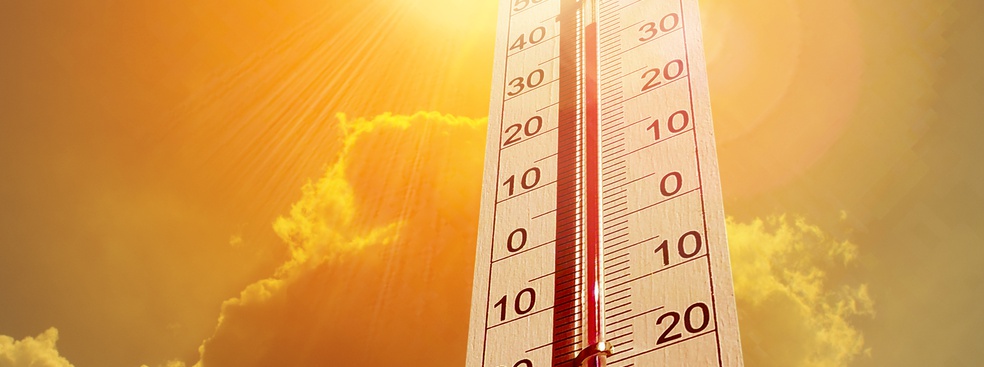Climate change is not only bad for the planet - it’s also bad for our health. How are researchers, namely health economy researchers, exploring the topic? Karine Lamiraud, chaired professor of the ESSEC Innovation & Health Chair, explores and explains the existing research.
A significant amount of research studies the consequences of rising temperatures and more frequent heat waves. The effects of air pollution and exposure to toxic chemicals are also widely studied. However, there is less research on the impact of floods, storms and cyclones.
The current body of research looks at the impact of climate change on mortality, physical health, mental health, well-being, and healthcare utilization and spending. In terms of methodology, these studies do not merely look at the correlations between climatic events and health status but rely on experimental or quasi-experimental settings that allow to make causal links between climate change and health. The research also evaluates the impact of policies enacted to attenuate the effects of climate change on population health.
These major subjects concern both developed and developing countries, and the research uses data from countries all over the world. That being said, many studies currently concentrate on developed countries that have longitudinal, long-term data at their disposal, like the United States.
What conclusions can we make today about the impact of climate change on our health, both in France and abroad? In this article, we focus on the impact of rising temperatures. Current research shows that heat impacts our physical health, with a rise of morbidity (the rate of disease) and mortality.
Most studies highlight an inverted-U shaped relationship between temperature and health (Lehmann et al., 2022). When temperatures rise, health initially improves too. However, past 30 degrees, health starts to deteriorate, with rising temperatures leading to an increase in hospitalizations and medical consultations.
During heat waves, there is a significant increase in health care utilization for patients with chronic illnesses. An Indonesian study showed that medical consultations jumped by 25% for patients with diabetes and by 14% for patients with cardiovascular illnesses, compared to an 8% rise for the general population (Fritz, 2022).
A decrease in physical health can even lead to death, as it’s been established that high temperatures are linked to a significant rise in mortality. In France, a 2023 report from Santé Publique France (the French public health entity) indicated that 33k deaths annually were caused by heat between June 1st and September 15th. The effects on mortality are more serious in regions that aren’t used to high temperatures (Barreca, 2015) and in less wealthy countries.
Heat and mental health
Recent research also suggests that heat can have a significant impact on our mental health. Researchers have found that temperatures above 30 °C are linked to an increase in depressive symptoms (Hua et al., 2023) and even an increase in suicide risk (Burke et al., 2018). Several papers show an increase in visits to psychiatric ERs during heat waves (Nori-Sarma et al., 2022).
Emerging literature is exploring the impact of higher temperatures on subjective well-being. Karine Lamiraud, Frederik Booysen and Ibrah Seninde (the latter two from University of Witwatersrand, Johannesburg) are currently leading a study with South African data on the topic. The preliminary results suggest that high temperatures are associated with a decrease in well-being and quality of life. This area needs further research, as there are few studies exploring the link.
We have more information about the impact of high temperatures on cognitive capacity. Researchers have observed a decrease in attention, concentration, and short-term memory capacity (Graff Zivin et al., 2020). A recent articleusing Indonesian data, shows that heat temporarily increases irrational behavior and impatience (Escobar Carias et al., 2024). At the workplace, productivity and performance decline, even when work is done indoors (Park et al., 2020; Park, 2022).
Possible mechanisms
One possible mechanism is physiological: high temperatures cause stress and disturb our thermoregulation system.This impacts physical health and, indirectly, mental health.
Several studies have also uncovered a second mechanism: decreased sleep quality during heat waves (Mullins and White, 2019). Poor sleep then acts as a key mediator in the effect of elevated temperatures on health and in particular on mental health.
A third possible mechanism is the modification of preventive behavior during heat waves. A study using Chinese data (Zhang et al., 2023) reveals that heat waves lead to increased alcohol consumption and a less balanced diet, which can lead to a decline in mental health indicators.
What can we do?
Researchers are also evaluating adaptation and avoidance strategies to reduce the negative effects of high temperatures on our health.
Research conducted in Western countries shows that the effects of extreme temperatures on mortality have dropped over the last few decades.
We can thank air conditioning for this improvement. In the United States, researchers estimate that residential air conditioning explains virtually all of the reduced correlation between extreme temperatures and mortality, by reducing the relationship between actual and perceived temperatures (Barreca et al., 2016). However, for other aspects of health like mental health and especially well-being, studies do not show a significant improvement following the rise of air conditioning (Hailemariam et al. 2023, Mullins et White, 2019, (Hua et al., 2023).
Another path for weakening the relationship between extreme temperatures and health is healthcare. In the United States, a study shows that the relationship between heat and mortality dropped by 14.2% with the launch of community health centers, which allow underprivileged people to have better access to healthcare (Mullins & White, 2020). It’s urgent that community or private initiatives are launched widely to offer psychological support during heat waves (Ningsih et al., 2024).
A third strategy is linked to improving the precision of meteorological predictions. One study indicates that improving precision by 50% could save 2200 lives per year in the United States (Schrader et al., 2023). This is because we adapt our behavior as a result of the weather forecast. When the forecast calls for a day over 30 °C, we reduce our physical activity and adapt our schedule to tasks we can get done at home.
Finally, research suggests that the diffusion of preventative messaging, like dietary advice, encourages people to adapt what they eat, by reducing the amount of alcohol consumed in favor of eating more fruit and vegetables during hot days (Zhang et al., 2023).
Next steps
-
We need to have a better understanding of climate change’s long-term consequences on health. The existing research mostly focuses on short-term fluctuations, but does not allow us to infer the effects of long-term exposure to high temperatures. The speed at which people adapt to high temperatures is a key element - and one we don’t know much about.
-
Future work also needs to deepen our understanding of the mechanisms explaining the impact of high temperatures on health.
-
We need to promote multidisciplinary research, in particular by encouraging collaboration between medical experts, health economists, and climate scientists. Medical experts are well-placed to identify how our health is impacted by climate change. The use of climate data requires the expertise of a climate scientist, while the methodological setup used by economists allows for a more precise and rigorous evaluation of the consequences.
-
Access to data is another key challenge. In the United States, health economists have long used Medicare data, the health insurance program for people over 65. It offers longitudinal data on healthcare reimbursement for millions of Americans. In France, a 2016 law allows researchers to ask for access to health data. However, the process is long and not many studies use this data, even though it is a precious resource for studying the effects of climate change on healthcare utilization. It’s critical to use this data in the future, in particular in combination with climate information. This approach will be very informative in understanding the impact of climate change in France, and this is the approach that we are using at ESSEC Business School.
References
Barreca, A., Clay, K., Deschênes, O., Greenstone, M., Shapiro, J. S. (2016). Adapting to Climate Change: The Remarkable Decline in the U.S. Temperature-Mortality Relationship over the Twentieth Century. Journal of Political Economy, 124(1), 105–159.
Barreca, A., Clay, K., Deschênes, O., Greenstone, M., Shapiro, J.S. (2015). Convergence in Adaptation to Climate Change: Evidence from High Temperatures and Mortality, 1900–2004. American Economic Review: Papers & Proceedings, 105(5), 247–251.
Burke, M., González, F., Baylis, P., et al. (2018). Higher temperatures increase suicide rates in the United States and Mexico. Nature Climate Change, 8, 723–729.
Escobar Carias, M., Johnston, D.W., Knott, R., Sweeney, R. (2024). Temparature’s Toll on Decision-Making. The Economic Journal, 1–26 https://doi.org/10.1093/ej/ueae036
Fritz, M. (2022). Temperature and non-communicable diseases: Evidence from Indonesia's primary health care system. Health Economics, 31(11), 2445–2464. https://doi.org/10.1002/hec.4590
Graff Zivin, J., Song, Y. Tang, Q., Zhang, P. (2020). Temperature and high-stakes cognitive performance: Evidence from the national college entrance examination in China. Journal of Environmental Economics and Management, 104, 102365.
Hailemariam, A., Awaworyi Churchill, S., Appau, S. (2023). Temperature, health and wellbeing in Australia. Journal of Behavioral and Experimental Economics, 106, 102065.
Hua, Y., Qiu, Y., Tan, X. (2023). The effects of temperature on mental health: evidence from China. Journal of Population Economics, 36, 1293–1332.
Lehmann, F., Alary,P.E., Rey, G., Slama, R. (2022). Association of Daily Temperature With Suicide Mortality: A Comparison With Other Causes of Death and Characterization of Possible Attenuation Across 5 Decades. American Journal of Epidemiology 191(12), 2037-2050.
Mullins, J.T., White, C. (2019). Temperature and mental health: Evidence from the spectrum of mental health outcomes. Journal of Health Economics, 68.
Mullins, J. T., & White, C. (2020). Can access to health care mitigate the effects of temperature on mortality? Journal of Public Economics, 191, 104259.
Ningsih, A.P., Makkau, B.A., Indirwan, D. (2024). Mental health problem, extreme temperature and potential solution. Journal of Public Health, 46(3).
Nori-Sarma, A., Sun, S., Sun, Y., et al. Association Between Ambient Heat and Risk of Emergency Department Visits for Mental Health Among US Adults, 2010 to 2019. JAMA Psychiatry, 79(4):341-349. doi:10.1001/jamapsychiatry.2021.4369
Park, R.J., 2022. Hot temperature and high-stakes performance. Journal of Human Resources, 57 (2), 400–434.
Park, R.J., Goodman, J., Hurwitz, M., Smith, J., 2020. Heat and learning. Am. Econ. J.: Econ. Policy,12 (2), 306–339.
Santé Publique France (2023). https://www.santepubliquefrance.fr/presse/2023/fortes-chaleurs-et-canicule-un-impact-sur-la-mortalite-important-necessitant-le-renforcement-de-la-prevention-et-de-l-adaptation-au-changement-cl
Shrader, J.G., Bakkensen, L., Lemoine, D. (2023). Fatal Errors: The Mortality Value of Accurate Weather Forecasts. NBER Working Paper 31361
Zhang, X., Chen, F., Chen, Z. (2023). Heatwave and mental health. Journal of Environmental Management, 332:117385.









